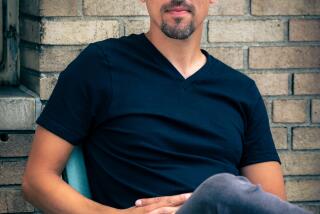Cajun’s Top Crusader Takes Center Stage : Music: Marc Savoy, who will get an NEA Heritage Award in the fall, brings his traditional button accordion to this weekend’s Cajun & Zydeco Festival.
- Share via
The best way to get a feeling for Marc Savoy isn’t by listening to his traditional Cajun music or by looking at the finely crafted accordions he makes, but by reading the cabinet doors in his workshop in the small southern Louisiana town of Eunice. On them he’s kept sort of a running journal of his distinctive philosophy.
“Commercialism is the process where you take a quality product like beer or hot dogs or music and (mess) it up so the American people will buy it,” reads one panel.
Another rails at Cajuns who once ignored their now-popular culture: “You’ve turned your back on a hot bowl of gumbo in favor of a cold, tasteless American hot dog. Now that Cajun culture attracts worldwide attention you’ve decided to be a Cajun too.”
But the comment that probably most succinctly sums him up says: “My talent is neither making or playing accordion. My talent is that after 25 years of dealing with the local public I have not become a mass murderer.”
Those locals might sometimes feel murderous toward Savoy, too. Some will tell you that Savoy is stubborn and uncompromising and a fierce protector of seemingly minute elements of tradition. They’ll also tell you that he may be the most valuable asset that Cajun culture has.
“I don’t like to be called a musician and I don’t like to be called an accordion builder,” Savoy, 52, said recently by phone from his shop. “I’m more of a crusader than anything else. If you want to write about my accomplishments, write about me as a crusader.”
The National Endowment for the Arts agrees. The federal agency will award Savoy a prestigious Heritage Award as part of its folk arts program in September.
The same quality caught the attention of filmmaker Les Blank, whose documentary “Marc and Ann” is about Savoy and his wife, a Virginian who joined him in his crusade when they married 15 years ago. The film aired on PBS last year.
The truth is, though, Savoy is a fine accordion player and arguably the top Cajun accordion maker in the world. Both talents will be on display this weekend at the Southern California Cajun & Zydeco Festival when the acoustic Savoy-Doucet Band--Marc and Ann (guitar and vocals) and fiddler Michael Doucet--perform Saturday and Sunday at the the Rainbow Lagoon near the Long Beach Convention Center.
Marc Savoy will conduct a workshop on accordion maintenance and repair while Ann, author of the definitive “Cajun Music: A Reflection of a People,” will give a workshop on Cajun lyrics. But mostly Marc will be there as a walking advertisement for Cajun culture, continuing a mission that began when he was a child.
Back then, Cajuns--descendants of French Acadians who were kicked out of Nova Scotia in the late 1700s and settled in Louisiana--were considered second-class citizens, and their traditions and French language were scorned and ridiculed. His father’s generation was subjected to physical punishment for speaking French in school. Even when Marc was a child, Cajun traditions were looked down on.
“When I was in school it wasn’t physical punishment--more like the cold shoulder,” he said. “You were treated like a nerd or a dork.”
To pursue the music that caught his fancy, Savoy sought out the diminishing ranks of older people who kept it alive. With no one around who knew how to build a Cajun button accordion, he had to figure it out himself, improvising with curtain rods, toilet parts and other household items to make his first one at the age of 12.
Some 40 years later, he’s no less determined to dispel such misconceptions as the notion that “the terms folk culture or ethnic music mean poor and ignorant.” (Savoy holds a degree in chemical engineering and was raised in a comfortable and intellectually stimulating environment.)
And he’s encouraged that he’s finding more receptive ears for his philosophy.
“People are fine-tuning to the ethnic music and its diversity and subtleties and understanding that if you’re different it’s not a stigma, it’s an asset,” he said. “If I could give one last message to the public, that’s it: Your difference is an asset.”
More to Read
The biggest entertainment stories
Get our big stories about Hollywood, film, television, music, arts, culture and more right in your inbox as soon as they publish.
You may occasionally receive promotional content from the Los Angeles Times.








